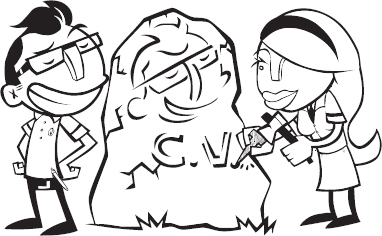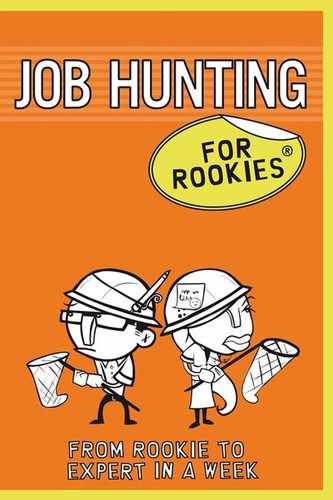CHAPTER 2
Understanding what
employers want
Appreciating the skills and qualities that employers want
Most employers believe that certain skills and qualities are essential in the people that they hire. And if you can show an employer that you have those skills and qualities, you can help yourself to stand out from the rest of the crowd.
Surveys frequently ask employers what they want from the people they hire, and I am going to share with you the top skills that employers talk about again and again. Employers may not always mention all of these top skills and qualities in the job advertisements that they place. Sometimes they just assume that candidates will have them.
Bear in mind that different employers emphasize certain skills and qualities over others – it’s up to you to figure out what’s important and what’s not. Suppose an organization is looking to fill a job for a sales person who will travel up and down the country to visit customers. As the sales person would be spending a lot more time with customers than colleagues, the organization would probably look for candidates who have influence and persuasion skills (in other words selling skills) more than team working skills.
Have a look through the following skills and qualities, and bear them constantly in mind as you start your job hunt.
 Rookie Buster
Rookie Buster
Bear in mind that different employers emphasize certain skills and qualities over others – it’s up to you to figure out what’s important and what’s not.
Communication skills
Employers want to hire people who can communicate thoughts and ideas with other people. Of course, there are different ways to communicate, so consider:
• Communicating face-to-face with other people by talking, listening, and sharing ideas.
• Having a good telephone manner – being able to speak and be understood clearly.
• Communicating in writing, for example in letters, emails, and other documents.
Influence and persuasion
Employers don’t just want people who can communicate by telling others what they should be doing. No one likes to be told what to do all of the time. So employers prize influence and persuasion skills too. Employers look for people who can win others over or change their minds. Examples of influence and persuasion include:
• Getting other people to change their point of view.
• Convincing others to pursue a course of action or recommendation of yours.
• Talking customers or clients into buying products or services.
Team work
I’m sure you hear about this one all the time. Most employers want to hire people who will help each other out rather than focus only on what each individual is supposed to be doing. Elements of good team working include:
• Helping colleagues or other members of the team with practical problems such as too much workload.
• Giving advice to other people at work to help them do their jobs –even when helping them isn’t necessarily part of your job.
• Keeping the morale of the team up by being positive and enthusiastic.
Problem solving
Employers want to hire people who can take on difficulties or challenges and work out how to deal with them. For example, this could include:
• Looking at a problem and coming up with different ideas or options for handling it.
• Breaking complex problems down into smaller issues that are more easily handled.
• Weighing up the pros and cons of different options or choices and finally taking a course of action to handle the situation.

Planning and organizing
I’m sure you won’t be surprised to hear that organizational skills are in high demand. Employers look out for people who can make plans and organize their work-load. This might include:
• Organizing your own workload – for example, when you have too much work to do, being able to prioritize what’s important and what’s less important, in order to ensure you get important work completed.
• Managing projects by making plans to ensure that everything gets done and nothing gets forgotten.
• Coordinating with other people to get large pieces of work done; and delivering them on time and on budget.
Adaptability and flexibility
Employers don’t want to hire people who will work in a rigid or inflexible manner. They want to hire people who can be accommodating and willing to change their plans or their minds if necessary. Being adaptable and flexible includes behaviour such as:
• Being willing to stay late or come into work early occasionally to help the rest of the team out when there’s a lot of work on (and being punctual all of the rest of the time).
• Offering to help other people with their workload even though their work may not strictly be part of your job description.
• Being willing to listen to other people’s opinions and staying open-minded enough to change your mind when they have a valid argument.
Drive and initiative
You may have heard employers sometimes talk about wanting to hire people who are “self-starters”. They want people who are self-motivated and willing to put more effort in when the work gets tough. This may include:
• Being able to handle setbacks by trying harder.
• Looking for different approaches rather than giving up in the face of adversity.
• Being on the lookout for newer and better ways of doing things rather than simply accepting inefficiencies and problems at work.
The human touch
Now, employers probably won’t ever use the phrase “the human touch”. But I use the phrase to mean a bunch of qualities that includes warmth, humour and integrity. After all, who wants to work with an efficient but cold and emotionless robot? Consider:
• Being upbeat and enthusiastic.
• Having a positive attitude.
• Being friendly and approachable to colleagues, customers, and anyone else you may need to deal with.
Understanding organizational goals
Demonstrating that you have the necessary skills and qualities will help you in the right direction towards getting a new job – but that gets you only part of the way. To secure a job, you need to demonstrate that you can use your skills and qualities to help employers to achieve their goals. Most organizations have goals that are some combination of the following:
• Making money.
• Reducing costs/saving money.
• Getting things done more quickly.
• Making work easier.
• Growing the size of the organization.
• Developing people within the organization, for example by coaching and mentoring them.
• Attracting new customers or clients.
• Retaining customers or clients.
• Promoting a message or the brand and image of the organization to people outside the organization.
Not all organizations have the same goals. For example, an investment bank may be highly motivated by making money, while a children’s charity may be more interested in promoting its particular message. But if you can figure out the goals that interest different employers, you can very quickly learn how to make yourself a lot more attractive to them as an applicant.
 Rookie Buster
Rookie Buster
To secure a job, you need to demonstrate that you can use your skills and qualities to help employers to achieve their goals.
Deciphering job adverts
The job advert is an important source of information in your hunt for a job. It tells you what you should emphasize or leave off your CV. And, once you get invited along to an interview, it tells you about likely questions that you may be asked.
In putting together your application for a job, have a thorough read of the employer’s job advert. A good tip: use a highlighter pen to pick out key words and phrases that alert you to the kinds of skills, qualities and goals achieved that an employer is looking for in the ideal candidate.
 Rookie Buster
Rookie Buster
Use a highlighter pen to pick out key words and phrases that alert you to the kinds of skills, qualities and goals achieved that an employer is looking for in the ideal candidate.
Job advert: example 1
Have a look at the following job advert:
LAW FIRM SEEKS PERSONAL ASSISTANT TO CHAIRMAN
Jackson, Kennedy & Anderson Partners (JKA) is looking for a personal assistant to support the Chairman of the firm. The successful candidate must:
• Have excellent communication skills – you will deal with senior clients both over the telephone and when they visit the office too.
• Possess good computer skills – you must be able to use word processing, email, and diary management packages to assist the Chairman with all of his secretarial needs.
• Be capable of working to tight deadlines to meet the needs of both the Chairman and external clients.
£ dependent on experience.
Email: [email protected]
So what key words and phrases catch your attention? What skills and qualities do you think you would need to include on your CV? What skills and qualities do you think you would need to speak about if you were invited along to an interview?
Looking at the advert, we can deduce that:
• As the job is looking for a “personal assistant”, you will stand the best chance of getting the job if you have already been a personal assistant in the past. You’d have an even better chance of getting the job if you have previously worked under a senior person such as the chairman of a firm, the managing director, or at least another high-ranking manager.
• “Excellent communication skills” are a must-have. I would recommend that you take that phrase and repeat it in a prominent place on your CV to catch the employer’s attention. And, if you were to go along to an interview, of course you would have to explain exactly why you believe you have “excellent communication skills”.
• “Good computer skills” similarly dictates that you should repeat that phrase on your CV. If you have experience of particular programs or software packages, you may need to list them on your CV and/or be ready to talk about them during an interview.
• The phrase “working to tight deadlines” also looks important.
Again, a good tactic when putting together a CV is to repeat back key phrases that the employer has mentioned. Plus, if you get invited to an interview, you would need to give examples of times when you have worked to tight deadlines too.
Job advert: example 2
Here’s a different job advert:
GROWING COMPANY SEEKS COMPUTER SALES EXECUTIVE
Opportunity to join growing IT company for two sales executives with experience of selling both hardware and software. You would ideally have knowledge of the Zeta2 and ORKM hardware systems. You must have exceptional relationship building skills and a proven track record of selling to owner-managers and IT managers in small- and medium-sized organizations. You must enjoy travelling extensively. Call Peter Maxwell on 01307 991 6701 for further details and an application form.
Certain key phrases suggest how you should go about trying to get this job:
• The advert mentions sales and selling three times (“sales executives”, “selling”, and “a proven track record of selling”). Given that this employer is so interested in sales and selling, you should probably describe in quite a lot of detail on your CV the sales experience that you have. At interview, you would also have to be ready to talk at length about your sales experience.
• “Selling both hardware and software” implies that you must mention your experience of selling both hardware and software.
• “Knowledge of the Zeta2 and ORKM hardware systems” suggests that your application would be much stronger if you mention these two systems on your CV. However, the fact that the advert says that you should “ideally” have them means that you may still have a shot at the job even if you do not have direct experience of them. But do mention any related systems that you are familiar with.
• “Exceptional relationship building skills” suggests that you should use this phrase on your CV too. In order to get an employer’s attention, there’s nothing like repeating back to an employer exactly how you match up to what they are looking for.
• Another key phrase is: “Selling to owner-managers and IT managers in small- and medium-sized organizations.” If you can genuinely mention how you have sold to owner-managers and IT managers in the past, particular in small- and medium-sized businesses, you will almost certainly become a very attractive candidate.
• The phrase “enjoy travelling extensively” indicates that you should mention this both on your CV and during interview too.

Researching employers
Employers like to feel special. They don’t just want to hire people who have the skills and qualities that will help them to achieve their goals. Employers want to hire people who want to work for their particular organization over any others. And in order to demonstrate that you want to work for any particular employer, you have to do some research.
 Rookie Buster
Rookie Buster
Employers want to hire people who want to work for their particular organization over any others.
At a minimum, you should be able to answer the following questions about the employer:
• What sort of work does the organization do? What services or products does the organization offer?
• Who are the key people within the organization? If you can find out the names of the founders, the managing director, any of the board members, or other senior people, you can look them up online and find out about their backgrounds.
• Who are the organization’s competitors? What products and services do those competitors provide?
• How is this organization special? Many employers are actually very similar to their competitors. However, almost all organizations at least believe themselves to be special and different from their competitors. In what ways?
• What is going on with the organization? What events are affecting the organization either right now or in the future? What are the trends and issues facing the organization and the general sector?
Going online
Thankfully, the internet has made researching employers a lot easier. Here are some great sources of information about the organization and its work:
• Their own website. Nowadays, even fairly small organizations often have their own websites. Telephone the company and ask for its web address – you may find useful information such as their annual report, press releases, news and basic facts about what the organization does, its aims and ambitions.
• Your favourite search engine. I use Google, but you may prefer some other search engine. Tap the name of the company into a search engine and you will probably find all sorts of news and snippets about the organization. Also type the name of the industry (for example, publishing, education, financial services, the non-profit sector) or the job title of the profession (such as social worker, chemical engineer, human resources officer) into the search engine too. That way you will gain a solid appreciation of both the job you are applying for and the sector or industry in which the organization operates.
Getting up close and personal
Going online and reading up on an employer is a good start. But you can get a lot more information by getting out and about too. Make sure you:
• Visit any physical locations and premises. Make sure you go along to any shops, branches, salons, showrooms, etc. And to get an appreciation of what the organization’s competitors do, make sure you visit them too. Try to buy, use, or otherwise get a feel for the organization’s services or products.
• Talk to people who are associated with the organization. Pop into any shops, branches or showrooms, and talk to the staff. Tell them that you are considering working for the organization and ask them for their thoughts. You may even get advice on how to put together a better application!
 Rookie Buster
Rookie Buster
Try to buy, use, or otherwise get a feel for the organization’s services or products.
Coach’s notes 
For each organization you want to apply to, you must:
• Work out the list of skills and qualities that the employer is looking for. Bear in mind that the employer may mention some of these in the job advert. However, others may be implied. It’s up to you to figure out what to put on your CV to grab the employer’s attention.
• Consider the organization’s goals. Once you have worked out what the organization is trying to achieve, you can put together examples of how you have delivered similar outcomes for previous employers.
• Keep a copy of every job advert that you apply for. This is the single richest source of information that will tell you both what to put on your CV and what to talk about at interview.
• Remember that employers like to feel special – and you can make them feel special by demonstrating the amount of information and insights you have dug up about them.
• Do go online for research – but don’t rely on it. Visiting premises and talking to staff can give you access to information about the organization and what’s happening to it that isn’t available on the internet.
Go for it! Make sure you do some research! Yes, yes, I know it takes time. But it’s time well spent. Think of research as a weapon to keep you ahead of the competition. Do just a couple of hours of research for each job that you apply for and you give yourself the very best chance of getting the job. You can do it!

Notes |
Notes |

Your CV is usually your first point of contact with an organization. Long before employers have the chance to meet you in person, they need to be impressed by the document that is your CV. In this chapter, I tell you how to grab an employer’s attention, how to steer clear of common traps and pitfalls, and why you need to have many CVs rather than just the one.
